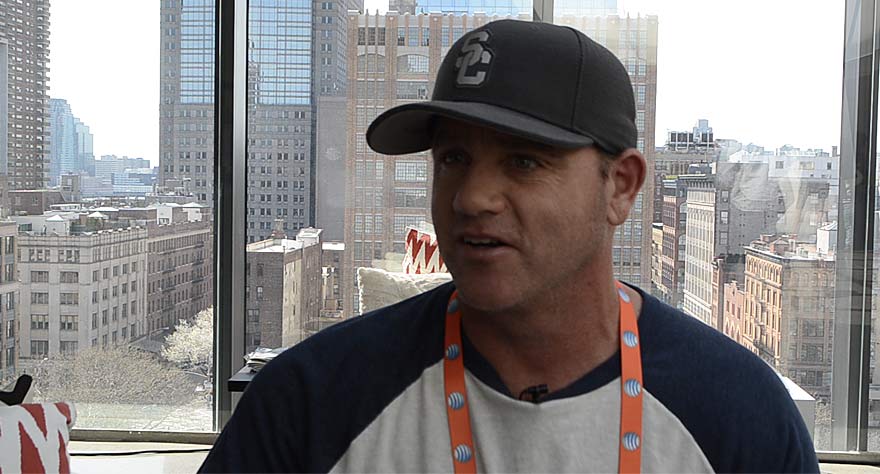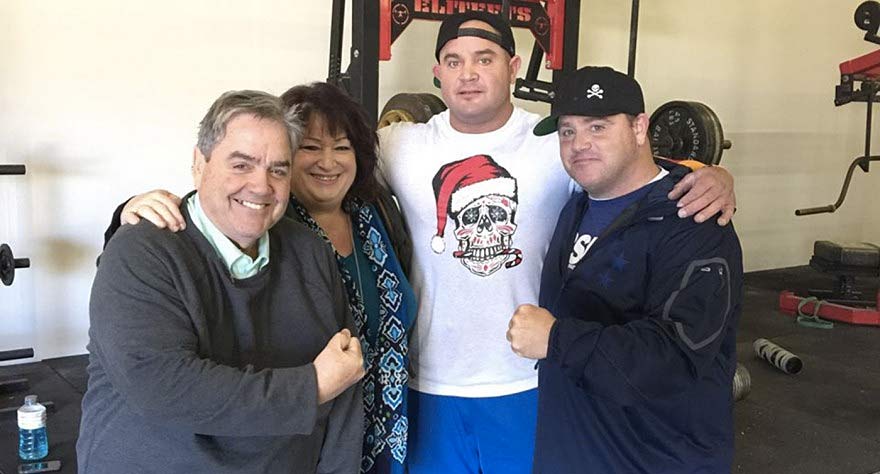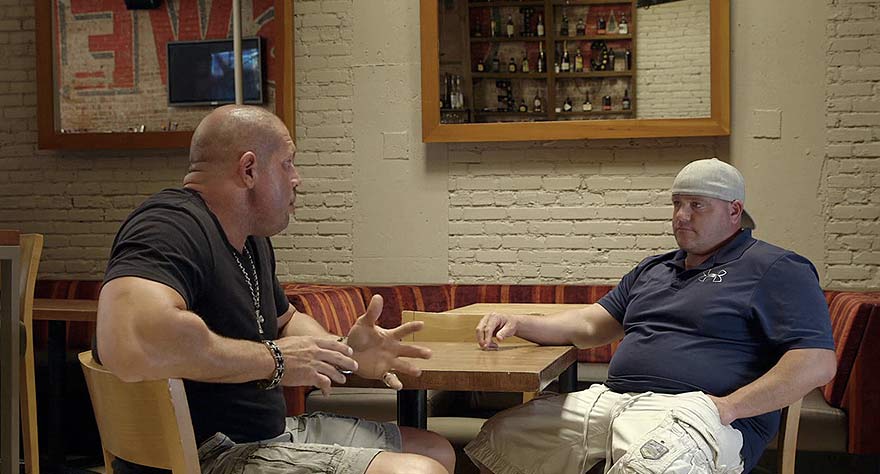‘Prescription Thugs’ Director Chris Bell on Making His Film While Struggling With Addiction

Chris Bell‘s documentaries hit close to home. Often putting both himself and his family in front of the lens, Chris gets deeply personal in order to examine the issues that creep into the lives of ordinary Americans. With his first documentary Bigger Stronger Faster, Bell began by looking at the relationship he and his siblings (Mike, a WWE wrestler and Mark, a powerlifter) had to the world of steroids, as well as the expanding realm of cosmetic drugs. In the years since BSF‘s 2008 Sundance Film Festival debut, Bell’s focus shifted to prescription drug abuse with his new documentary Prescription Thugs. In part, it was a result of his older brother Mike, aka “Mad Dog”, who died in 2008 after struggling with a drug problem; however, at the time, Chris was harboring his own secret addiction issues.
In his interview with Way Too Indie from the 2015 Tribeca Film Festival, documentarian Chris Bell opens up about putting himself and his family on camera for his documentaries, confronting the duality of making a documentary about addiction while dealing with your own addiction struggles, and his early aspirations of directing a Rambo movie.
When did your interest in making documentaries first come about?
I never wanted to make documentary films. I didn’t even know what they were. I just wanted to blow shit up. Basically, I wanted to make Arnold Schwarzenegger movies and Sylvester Stallone movies. I was [going to] Gold’s Gym – I went to USC film school – and I met this kid Alex Buono at film school. I was telling him this whole story of a bodybuilding, fitness script I wanted to do. He was like, “You know all these people, you should this as a documentary.”
Once I got into it, it was so much fun and so poignant. I was saying things in the documentary that I could never say in a narrative film. Very rarely do narrative films change your life. For me Rocky, Braveheart were those kind of movies. If I can’t make something like that I think documentaries are the way to go. I like to clear out the bullshit and just tell the truth.
That’s what ended up getting me involved in documentaries and I’ve stayed in it because there are so many things that keep attracting me back to it. Every time I go to make something narrative I get pulled back in.
Right, if it doesn’t have that point, or some message you’re not as interested in pursuing it?
When I ask a lot of people about their film or their script, I’m like, “What point in the world is that going to make?” Not to say that those aren’t good or great films but for me I need to make a serious point with everything that I make.
A lot of your movies are really personal, as well. They involve your family, involve what you’ve personally gone through. Does that provide an additional motivation or is it challenging?
Well when we did Bigger Stronger Faster and my parents were involved I thought that nobody was going to care about [them]. We had our first test screening and everybody was saying, “I could watch a whole movie with just you and your family. Your brothers and your parents.” I realized after Bigger Stronger Faster, everybody said, “How’s [your brother] Mad Dog doing? I want to know how Mad Dog’s doing.”
To me that always resonated. I thought I had to do something [for] Mad Dog. I started watching all the old footage from Bigger Stronger Faster and I realized that a lot of people don’t know that he passed away. So if I start the movie with all this footage of him talking to me, it will look like a continuation of Bigger Stronger Faster. For a lot of people they were so shocked that he passed away.
I think that was a really great way to honor my brother. He was my hero my whole life.

When you’re making a documentary that’s dealing with something so painful, what’s the decision process like of choosing to document it?
Look, losing your brother sucks. Losing any family member sucks. Losing any friend sucks. The thing that you have to do is you have to look at it like, “How can my brother’s death not be in vain?” Yeah, it’s personal, but it’s way more important for me to tell you this story so that it doesn’t happen to you, and your brother, and your family.
I know a lot of people care about how much money their movie makes – I want this movie to be seen by everybody when they go to rehab or when they’re in high school. That kind of thing excites me. Health teachers and college professors, they email me all the time saying they showed Bigger Stronger Faster in their class. If we can replace the old school educational films with some really important, good documentaries then I think kids will be way better off. They’ll be much more informed, and that’s important.
Your documentaries are very engaging, you have central characters and your voiceovers directly address the audience. Is that a focus going into the filmmaking process?
It is, it’s kind of weird. When I first did Bigger Stronger Faster, some of the first criticisms were like, “Oh, he’s trying to be like Michael Moore.” Everybody says that because Michael Moore was the originator of that style but in Bigger Stronger Faster I actually never wanted to be in it. I was talking about like, “Hey, maybe we should get The Rock to narrate this!” I knew him from the gym and different things.
My producer’s like, “No you need to be in it. This is your story. You’re in the middle of this.” So once we started shooting I ended up in the middle of it. Everything was so organic that it just worked. It all came together and I think that’s [because] nothing’s forced.
When we did Prescription Thugs there was a lot of ‘Should I be in it? Should I not be in it?’ We tried to catch lightning in a bottle twice and see if we can do something that’s really impactful again.
How long did it take to put Prescription Thugs together?
Prescription Thugs is kind of a weird movie for me. I was going through my own addiction issues while I was making the movie. I’m now one year sober but in the past year I haven’t put a whole lot of time into Prescription Thugs because we had mostly shot everything and my partner was editing here in New York [while] I was in L.A.
It was a lot of work up front. I wrote the treatment, I got everybody together and while I was doing all this I didn’t realize that I had a really bad drug addiction that I needed to fix before I could make the movie. Then my partner Greg Young was amazing in the fact that he never faltered. When I went to rehab he thought to shut it down, he just wanted to keep cranking.
He kept putting pressure on our other producers like, “Hey we’ve really got something here.” I remember when he made the call to Peter Billingsley and all the executive producers that put the money in. He was like, “Hey, Chris is having a problem, he went to rehab, but he’s willing to put it all in the movie.” I wanted to make sure he told them that so they don’t think everything that we’ve done is for nothing.

There’s no hesitation in opening up that way?
Once I was in it this deep I had to tell the whole story, I had to tell the truth, I had to come clean. When I had a drug addiction problem I couldn’t tell anybody. When I met my girlfriend, I said, “Man, I can’t mess this up. I may never get this chance again.” After maybe two months with her, [she] was the first person I ever told. I told her I have a drug and alcohol problem.
After seven days of being clean I started having the shakes and having these withdrawals and I relapsed. After that she called my brother and my whole family bonded together [with my girlfriend] to help me. I went up to my parents’ house, I still had some Xanax in my, I was kind of loopy in bed, and I kept telling my mom, “Just call Richard Taite.” It was sort of like, “Help me Obi Wan Kenobi.” I kept saying it, “Call Richard Taite he can help me.”
My mom calls [my producing partner] Greg and she’s like, “Chris keeps talking about this guy Richard Taite.” Greg’s like, “Oh, we interviewed him, he owns Cliffside Malibu.” When Richard Taite found out what happened to me he was so willing to step in and help, basically save my life and change my life.
How did you struggle to make a film about addiction while dealing with your own addiction issues?
Everyday… Look, my soul is good. I was trying to do a good thing. When I first interviewed Richard he said to me, “I knew there was something wrong with you, I didn’t know exactly what it was but I knew that you had a problem.” I said, “Why didn’t you stop me? You’re an addiction specialist.” He goes, “You never get in the way of somebody doing something good.”
It all played out the right way. God has a way of making things come full circle so when [Richard] came back into the movie it was really interesting. None of this was planned, obviously, it’s just a crazy story. I was trying to make a movie about prescription drug addiction and I was still doing it. That’s what I want people to realize, that’s how powerful it is.
I haven’t had a drink in a year and I feel amazing. I haven’t been in better shape in a long time, I haven’t felt better. I think that that’s going to transfer into the next film I make, I’m going to smash it out of the park. I know that because I’m going to be sober the entire way.
